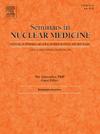Total Body PET/CT: A Role in Musculoskeletal Diseases
IF 5.9
2区 医学
Q1 RADIOLOGY, NUCLEAR MEDICINE & MEDICAL IMAGING
引用次数: 0
Abstract
Recent advancements in PET technology have culminated in the development of total-body PET (TB-PET) systems, which overcome many limitations of traditional scanners. These TB-PET scanners, while still becoming widely available, represent the forefront of clinical imaging across numerous medical institutions worldwide. Early clinical applications have demonstrated their enhanced image quality, precise lesion quantification, and overall superior performance relative to conventional scanners. The capabilities of TB-PET technology, including extended scan range, ultrahigh sensitivity, exceptional temporal resolution, and dynamic imaging, offer significant potential to tackle unresolved clinical challenges in medical imaging. In this discussion, we aim to explore the emerging applications, opportunities, and future perspectives of TB-PET/CT in musculoskeletal disorders (MSDs). Clinical applications for both oncologic and non-oncologic musculoskeletal diseases are discussed, including inflammatory arthritis, infections, osteoarthritis, osteoporosis, and skeletal muscle disorders. From the ability to visualize small musculoskeletal structures and the entire axial and appendicular skeleton, TB-PET shows significant potential in the diagnosis and management of MSD conditions as it becomes more widely available.
全身 PET/CT:在肌肉骨骼疾病中的作用
正电子发射计算机断层显像(PET)技术的最新进展最终促成了全身正电子发射计算机断层显像(TB-PET)系统的开发,该系统克服了传统扫描仪的许多局限性。这些 TB-PET 扫描仪虽然仍在广泛使用,但已成为全球众多医疗机构临床成像的前沿技术。早期的临床应用已经证明,与传统扫描仪相比,TB-PET 扫描仪具有更高的图像质量、更精确的病变量化和更优越的整体性能。TB-PET 技术的功能,包括扩展扫描范围、超高灵敏度、卓越的时间分辨率和动态成像,为解决医学成像领域尚未解决的临床难题提供了巨大的潜力。在本次讨论中,我们将探讨 TB-PET/CT 在肌肉骨骼疾病 (MSD) 中的新兴应用、机遇和未来前景。讨论了肿瘤性和非肿瘤性肌肉骨骼疾病的临床应用,包括炎症性关节炎、感染、骨关节炎、骨质疏松症和骨骼肌疾病。TB-PET 能够观察到小型肌肉骨骼结构以及整个轴向和附着骨骼,随着它的普及,它在 MSD 疾病的诊断和管理方面显示出巨大的潜力。
本文章由计算机程序翻译,如有差异,请以英文原文为准。
求助全文
约1分钟内获得全文
求助全文
来源期刊

Seminars in nuclear medicine
医学-核医学
CiteScore
9.80
自引率
6.10%
发文量
86
审稿时长
14 days
期刊介绍:
Seminars in Nuclear Medicine is the leading review journal in nuclear medicine. Each issue brings you expert reviews and commentary on a single topic as selected by the Editors. The journal contains extensive coverage of the field of nuclear medicine, including PET, SPECT, and other molecular imaging studies, and related imaging studies. Full-color illustrations are used throughout to highlight important findings. Seminars is included in PubMed/Medline, Thomson/ISI, and other major scientific indexes.
 求助内容:
求助内容: 应助结果提醒方式:
应助结果提醒方式:


